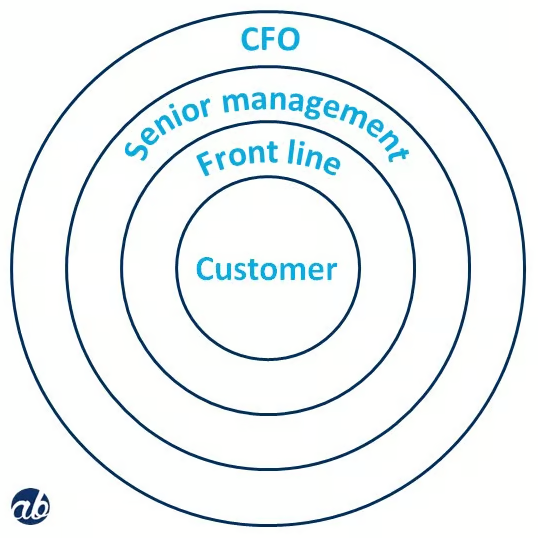If you're in the front line of an organisation, this is a no-brainer. In fact, it serves to inspire. If you work in a purpose led organisation this warm feeling you get because of how you serve the customer filters through the organisation even into the support, operational and 'business enablement' areas.
However, if you're not at the front line, like you and your finance team, an interesting distinction becomes apparent. Who are my customers? Are they my key stakeholders or our organisations customers/ end users?
Knowing the answer impacts the quality of our communication
This week I've taken myself out of the office to an idyllic (for me) location to write my latest book in an environment that ensures I'm focused, inspired and not prone to distractions (real or made up in my head). There is lots of space, fresh air and great views which allows me to pace, move my body and talk my thoughts out loud.
As I was working through some of the bigger concepts I got hit with the following question. Who am I writing this for? In my heart I felt I wanted to write it for my CFOs and C-suite clients. The ones I sit in the room and connect deeply with. I wanted to speak to them.
But when I asked myself, 'how can I serve them best?', I realised I - or in this case, my book - had an important role in shining the light on certain systemic issues to open the door for CFOs to have more compelling conversations within their organisation about performance.
It came down to the question: how can I help CFOs most?
How Finance connects to the corporate vision: do they really?
I thought about the times when I've heard finance leadership teams debate and tussle with this question as they try to make sense of and connect with the company vision or mission statement. Is their customer the person that buys the product or uses the service sold or is it their business unit or commercial stakeholders?
What I see is typically they want to name the customer as their 'customer' but then it becomes a long bow to draw when taking actions from the conceptual level to the practical level. Where do our corporate stakeholders fit in? They're customers too, right? They're the ones we develop strong connections and relationships with? They're the ones we need to influence to make the work happen.
I think as a CFO you need to help your team distinguish between a client and a customer in order to create coherence in their minds, so that without friction they can connect to the end buyer of the product/service your company is selling (and their 'why') and the work they do when we tinker with numbers and reports.
Let me ask, which of those terms is used by your sales people? Customer or client (or participant/ patient)? Use the other when you're trying to identify who Finance's customer is. If you're not sure what terminology they use, take an action to ask them later, but for now just use the term that feels most 'intimate' to you. For the purposes of this article I'm going to say that 'client' feels most intimate to me.
Defining who Finance's customer and client is
So the client is then who I personally serve. It's who I spend my time with, my days with. My client is who I develop relationships with, who I communicate with regularly and who's life I make easier or better. It's the person 'I' help.
In most cases, for CFOs, your client will be your stakeholders.
Contrast that to my customers. My customers are important because they are the ultimate purchaser/consumer and get the benefit of the product or service I provide. They might be the buyer, they might be the sponsor, or they might be the patient.
Extending this through the business, using this vernacular, your front line/sales person/practitioner deals directly with the customer.
The benefit of clarity
You might be thinking I've just incorporated more hierarchy in distinguishing between the 2, but my perspective is that this clarity will help you be more effective for you and your team to know the nexus between finance and your customer (end user) and it will bring more meaning to your work.
Your team will more able to understand how how they the corporate vision and mission which will create more drive and cohesion within your team and across the organisation. They will not see themselves as a 'support' or 'back office' function but rather as a critical input into the serving of the organisation's customers. They'll be genuinely motivated by the work they do because they'll know why it matters.
If your team understands this connection, their attitude and language will shift when they talk with their stakeholders (Finance's 'clients'), which will demonstrate their empathy toward them. This change in dynamic will allow them to work more effectively and cohesively together. They will let you in. They'll tell you what matters and how you can help. You'll be able to add value.
Who knows, they might invite you to their next customer visit.
Wouldn't that be valuable?
Love to hear your thoughts...


